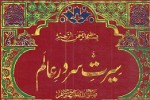
What is Prophethood?
-
Seerah
- at 30 June 2017
(From the Book Seerat Sarwar e Aalamï·º)
God has most graciously provided man with all that he needs in this Universe. Generally, every new-born child arrives in the world endowed with eyes to see, ears to hear, a nose to smell and breathe, hands to touch, feet to walk and a mind to think. All those potentialities, powers and faculties, that a man needs or can need are most carefully provided and marvelously set in his tiny body. Every minute requirement is foreseen and provided for.
It is the same with the world he lives in. Everything essential for his life is provided: air, light, heat, water and so on. A child on opening his eyes finds his food in his mother's breast. His parents love him instinctively and in their hearts, has been implanted an irresistible urge to look after him, to bring him up and to sacrifice there all for his welfare.
Under the sheltering care of His system of sustenance the child grows to maturity and at every stage of his life obtains from nature all that he needs. All the material conditions of survival and growth are provided for: he finds that the whole Universe is at his service.
Furthermore, man is blessed with all those powers, capacities and faculties -physical, mental and moral -, which he requires in his struggle for life. But God has not distributed these gifts equally. This would have made men totally independent of each other and would have excluded mutual care and co-operation. Thus, although mankind as a whole possesses all that is needed, between men capacities are distributed unequally and sparingly.
Some possess physical strength and prowess; others distinguish themselves for their mental talents. Some are born with a greater aptitude for arts, poetry and philosophy, some possess sharpness of tongue, others military acumen, commercial intelligence, mathematical keenness, scientific curiosity, literary observation or philosophical bent. These special aptitudes make a man distinct and enable him to grasp those intricacies, which elude the common man. These insights, aptitudes and talents are the gifts of God. They are innated in the nature of those men whom God has destined to be thus distinguished. They cannot be acquired merely by education and training.
Reflection on this disposition of God's gifts also reveals that man's talents have been distributed in a marvelous way. Those capacities, which are essential for the general maintenance of human culture, have been endowed to most people, while extraordinary talents, which are required only to a limited extent, are given only to a small number. There are many soldiers; peasants, artisans and workers; but military generals, scholars, statesmen and intellectuals are comparatively few. The general rule seems to be: the higher the capacity and greater the genius, the fewer people who possess them. Super geniuses, who leave an indelible mark on human history and whose achievements guide humanity for centuries, are fewer still.
Here we are faced with another question: do people just need specialists in the fields of law and politics, science and mathematics, engineering and mechanics, finance and economics and the like? Or do they also need men to show them the right path -the way to God and salvation? There must clearly be someone to tell man the purpose of creation and the meaning of life itself: what man himself is and why he has been created: who has provided him with all the powers and resources and why: what are the proper ends of life and how are they to be achieved: what are the proper values of life and how they can be attained.
Our reason refuses to accept that God, Who has provided man with even the smallest of his requirements, would not provide for this greatest and most vital need. It can never be so. And it is not so. While God has produced men of distinction in arts and science. He has also raised men with deep vision, pure intuition and the highest faculties to know and understand Him, to them. He revealed the way of godliness, piety and righteousness. He gave them the knowledge of the aims of life and values of morality and entrusted them with the duty to communicate Divine Revelation to other human beings. These men are the Prophets and Messengers of God.
The Prophets distinguish themselves in human society by their special aptitudes, natural bents of mind and a pious and meaningful way of life, more or less in the same way as other geniuses in art and science distinguish themselves by their extraordinary capacities and natural aptitudes. The genius in man is its own advertisement and automatically persuades others to recognize and acknowledge it.
Thus, a Prophet's mind grasps problems which defy other minds; he throws light on subjects which no one else can; he has insights into such subtle and intricate questions that no one else would have even understood after years of deep thought and meditation. Reason accepts whatever he says; the heart feels its truth; and experience of the world testifies to every word that flows from his mouth. If, however, we ourselves try to produce the same or a similar work, we inevitably meet with failure. In all affairs his attitude is that of truthfulness, straightforwardness and nobility. He never does or utters wrong, nor does he commit any evil. He always encourages virtue and righteousness, and practices himself what he preaches to others. Neither his words nor his deeds are prompted by self-interest. He suffers for the good of others, and never makes others suffer for his own good.
When it becomes quite clear that a person is a true Prophet of God, the natural dictate of this realization is that his words should be accepted, his instructions followed and his orders obeyed. It is illogical to accept a man as God's true Prophet and yet not to believe in what he says and not to follow what he ordains; for your very acceptance of him as God's Prophet means that you have acknowledged that what he says is from God and that whatever he does is in accordance with God's Will and Pleasure. Disobedience of him is disobedience of God -and disobedience of God leads to ruin.
Therefore, the very acceptance of a Prophet makes it incumbent on you to follow his instructions unconditionally. You may not be able fully to grasp the wisdom and usefulness of" this or that-order, but the very fact that an instruction has emanated from a Prophet is sufficient guarantee of its truth. One's inability to understand it does not mean there is something wrong with it. Rather it is our understanding, which is at fault.
Some men admit the integrity and truthfulness of a Prophet, but do not put faith (Iman) in him, nor do they follow him in the affairs of their life. Such men are not only Kafirs, but imprudent: for not to follow a Prophet after admitting him to be true means that one knowingly follows untruth. And what folly can be greater than that!
Some people declare: "We do not need a Prophet for our guidance and we can ourselves find the way to truth." This, too, is a wrong view. You have probably learnt geometry, and you know that between points there can be only one straight line; all other lines must be crooked or will fail to touch the points in view. The same is the case with the way to truth, which in the language of Islam, is called the Straight Path (al-Sirat al-Mustaqim). This path begins from man and goes straight up to God, and this path can by definition be one and only one; all other paths must be aberrations. This Straight Path has been indicated by the Prophets, and there is and can be no straight path besides that. The man who ignores that path soon finds himself lost in the maze created by his own fancy. What can you think of a person who loses his way and, when a good man shows him the right one, defiantly declares: "I will not take your guidance nor accept the way you have shown to me, but I will myself grope in this unknown region and try to reach the object of my search in my own way?" This, in the presence of the clear guidance of the Prophets, is sheer stupidity. If everybody tried to start from scratch, it would be a gross waste of time and energy. We never do so in the sciences and arts: why here?
If you go a little deeper into the matter, it will become clear that a person who disbelieves in a true Prophet cannot find any way, straight or otherwise, to God. This is because a man who refuses to believe the advice of a truthful man adopts such a perverse attitude that he ceases to understand the difference between truth and falsehood and becomes a victim of his own obstinacy, arrogance, bias and perversity. This refusal may be due to false arrogance, or blind conservatism and obstinate adherence to the way of one's forefathers, or to slavery to the lower desires of the self, whose gratification becomes impossible by submission to the teachings of the Prophets.
On the other hand, if a man is sincere and truth loving, the road to reality opens up to him. He will find in the teachings of the Prophets the very echo of his own soul and discover himself by discovering the Prophets.
Above all, a true Prophet is raised by God Himself. It is He Who has sent him to mankind to convey His message to His people. It is His Command that one should put one's faith in the Prophet and follow him. Thus, one who refuses to believe in God's Messenger refuses to follow God's Commandment and becomes a rebel. There is no denying that one who refuses to acknowledge the authority of the viceroy of a sovereign actually refuses the authority of the sovereign himself. This disobedience turns him into a rebel. God is the Lord of the Universe, the true Sovereign, the King of Kings, and it is the bounden duty of every man to acknowledge the authority of His Messengers and Apostles and to obey them as His Accredited Prophets. Anyone who rejects the Prophets of God is a Kafir, be he a believer in God or a disbeliever.
Brief History of Prophethood
Now let us look at the history of prophethood. Let us see how this long chain began, how it gradually unfolded itself and finally culminated in the prophethood of the last of the Prophets, Muhammad (blessings of Allah and peace be upon him).
The human race began from one man: Adam. It was from him that the family of man grew and the human race multiplied. All human beings born in this world have descended from that earliest pair: Adam and Evea. History and religion are agreed on this point. Nor do scientific investigations into the origin of man show that originally different men came into being, simultaneously or at different points of time, in different parts of the world. Most scientists conjecture that one man would have been brought into existence first and the entire human race might have descended from that one man.
Adam, the first man on earth, was also the first Prophet of God. He revealed His religion -Islam -to him and told him to convey and communicate it to his descendants: to teach them that Allah is One, the Creator, the Sustainer of the world; that He is the Lord of the Universe and He alone should be worshipped and obeyed: that to Him they would have to return one day and to Him alone they should appeal for help: that they should live righteous lives in accordance with God's pleasure and that if they did so they would be blessed and if they did not they would suffer both here and in the hereafter.
Those of Adam's descendants who were good trod the right path, but those who were bad abandoned their father's teachings. Some began to worship the sun, the moon and the stars; others took to the worship of trees, animals and rivers. Some believed that air, water, fire, health and all the blessings and forces of Nature were each under the control of a different god and that the favor of each one could be won by worship. In this way ignorance gave rise to many forms of polytheism and idolatry, and scores of religions were formulated. This was the age when Adam's progeny had spread over the globe, and formed different races and nations. Every nation had created a different religion for itself, each with rituals of its own. God -the one Lord and Creator of mankind and the universe was forgotten. Every kind of evil custom grew; many evils began to be considered right and many right things were either ignored or condemned as wrong. B & 9
كَانَ النَّاس٠اÙمَّةً وَّاØÙدَةً  Ùَبَعَثَ اللّٰه٠النَّبÙيّٖنَ Ù…ÙبَشّÙرÙÙŠÛ¡Ù†ÙŽ ÙˆÙŽÙ…ÙÙ†Û¡Ø°ÙرÙيۡنَ وَاَنۡزَلَ مَعَهÙم٠الۡكÙتٰبَ بÙالۡØَـقّ٠لÙÙŠÙŽØÛ¡ÙƒÙÙ…ÙŽ بَيۡنَ النَّاس٠ÙÙيۡمَا اخۡتَلَÙÙوۡا ÙÙيۡه٠​ؕ وَمَا اخۡتَلَÙÙŽ ÙÙيۡه٠اÙلَّا الَّذÙÙŠÛ¡Ù†ÙŽ اÙوۡتÙÙˆÛ¡Ù‡Ù Ù…ÙÙ†Û¡Û¢ بَعۡد٠مَا جَآءَتۡهÙم٠الۡبَيّÙنٰت٠بَغۡيًا Û¢ بَيۡنَهÙمۡ​ۚ Ùَهَدَى اللّٰه٠الَّذÙÙŠÛ¡Ù†ÙŽ اٰمَنÙوۡا Ù„Ùمَا اخۡتَلَÙÙوۡا ÙÙÙŠÛ¡Ù‡Ù Ù…ÙÙ†ÙŽ الۡØَـقّ٠بÙاÙØ°Û¡Ù†Ùهٖ​ Ø• وَاللّٰه٠يَهۡدÙÙ‰Û¡ Ù…ÙŽÙ†Û¡ يَّشَآء٠اÙلٰى صÙرَاط٠مّÙسۡتَقÙيۡم٠î€
(2:213) “In the beginning mankind followed one single way. (Later on, this state ended and differences arose.) Then Allah sent forth Prophets as heralds of good tidings for the righteous and as warner against the consequences of evil-doing. He sent down with them the Book embodying the Truth so that it might judge among people in their disputes. And those who innovated divergent ways rather than follow the Truth were none other than those who had received the knowledge of the Truth and clear guidance; and they did so to commit excesses against each other. So by His leave Allah directed the believers to the Right Way in matters on which they disagreed. Allah guides whomsoever He wills onto a Straight Way.”
When ignorant people attempt to trace the history of 'religion' they tend to the view that man began his life in the darkness of polytheism and that in the course of time, corresponding to man's progress, this darkness gradually receded and light increased till man arrived at monotheism.
The Qur'anic version, however, proclaims that man began his life in full light of the Truth. God revealed this Truth to the very first man He created, one to whom He intimated the right way of life for man. Thereafter the human race remained on the Right Way for some time and lived as one community. Later, however, people invented deviating ways. This did not happen because Truth had not been communicated to them. The cause was rather that some people willfully sought to acquire privileges, benefits and advantages beyond their legitimate limits, and thus subjected others to injustices. It was in order to enable people to overcome this corruption that God sent His Prophets. These Prophets were not sent to found separate religions in their own names and bring new religious communities into existence. Rather the purpose of the Prophets was to illuminate before people the Truth which they had allowed to be lost, and once again make them into one community.10
At this stage God began to raise Prophets among every people. Each one reminded his people of the lesson they had forgotten. They put an end to idol-worship and the practice of associating other deities with God (shirk), did away with all customs of ignorance, taught them the right way of living in accordance with God's pleasure, and gave them laws to be followed and enforced in society. God's true Prophets were raised in every land and among every people. They all possessed one and the same religion -the religion of Islam.c No doubt the methods of teaching and the legal codes of different Prophets varied in accordance with the needs and the stage of culture of the people among whom they were raised. The particular teachings of each Prophet were determined by the kind of evils, which he was trying to eradicate. When people were in the primitive stages of society, civilization and intellectual development, their laws and regulations were simple; they were modified and improved as the society evolved and progressed. Such differences were, however, only superficial. The fundamental teachings of all the religions were the same, i.e. belief in the unity of God adherence to a life of piety, goodness and peace, and belief in life after death with its just mechanism of reward and punishment. Man's attitude towards God's Prophets has been strange. He has ill-treated them and refused to accept their teachings. Some of the prophets were expelled from their lands; some were assassinated: some, faced with indifference, preached the whole of their lives without winning more than a few followers. But despite the harassment, derision and indignity, to which they were perpetually subjected, these Apostles of God did not cease to spread their message. Their patient determination at last succeeded: large groups of people and nations were converted to their creed. The false tendencies, born of centuries of deviation, ignorance and malpractice, now took another form. Though they accepted their Prophets during their lives and practiced their teachings, after their deaths they introduced their own distorted ideas into their religions. They adopted novel methods of worshipping God; some even took to the worship of their Prophets. They made the Prophets the incarnations of God or the sons of God; some associated their Prophets with God in His Divinity. In short, man's varied attitudes in this respect were a travesty of his reason and a mockery of himself; he made idols of those very persons whose holy mission was to smash idols. By intermixing religion, rituals born of ignorance, baseless and false anecdotes and man-made laws, men so changed and perverted the teachings of the Prophets over the centuries that they became lost in a welter of fictions to the extent that it became impossible to distinguish the grain from the chaff. Not content with this, they made up so many stories about their Prophets that real and reliable accounts of their lives became impossible to discern. Despite all this, the work of the Prophets was not altogether in vain. Traces of truth survived. The idea of God and of life after death was assimilated in some form or other. A few principles of goodness, truthfulness and morality were accepted throughout the world. The prophets thus prepared the mental attitude of their respective peoples in such a way that a universal religion could be safely introduced -a religion which accords with the nature of man, which embodies all that was good in all other creeds and societies, and which is acceptable to mankind.11
----
*a. This is a very important and revolutionary concept. Its logical outcome is unity of mankind and the equality of human beings. It is stupid to distinguish and discriminate between men on grounds of class, color, race or territory. In an age when nationalism, narrow racialism and bloodthirsty anti-Semitism have torn the world into shreds, this creed of the unity of mankind is a powerful ray of hope for the future. -Translator & Editor Prof. Khurshid Ahmad.
*b. This view of the history of religions is diametrically opposed to the so-called evolutionary view of religion, which regards nature-worship as the first stage. More modern scientific studies are confirming the view that worship of one God (Tawhid) was the earliest Form of worship and all other forms are perversions of that original religion. Those who want to pursue the topic may refer to Prof. W. Schmidt's valuable research treatise. The Origin and Growth of Religions, English translation by H. J. Rose (London. Methuen).
*c. There is a common misconception, mostly among Western writers, that Islam owes its origin to the Prophet Muhammad (blessings of Allah and peace be upon him) and some of the writers even go to the extent of calling him 'the founder of Islam'. This is a travesty of the truth. Islam has been the religion of all the Prophets of God and all of them have brought the same message from Him. Prophets have not been the founders of Islam: they have only been the messengers of it. Islam consists of the Divine Revelation conveyed to mankind by the truthful Prophets.
- Towards Understanding Islam (Deeniat-Urdu). Pages 19 to 22. Translated and Edited by Prof. Khurshid Ahmad
- Tafheem ul Quran (Towards Understanding the Quran)-Reference note 23o. Translated by Dr. Zafar Ishaq Ansari
- Towards Understanding Islam (Deeniat-Urdu). Pages 23 to 24. Translated and Edited by Prof. Khurshid Ahmad
-Author Syed Abul A'ala Maududi, compiled in Urdu by Naeem Siddiqui, and Abdul Wakeel Alvi, compiled in English by Syed Jawed Anwar.
Recent posts
-
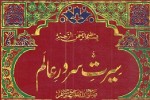
The Miracles of Prophets -2
17 May 2019 -
Muhammad The Guide of Mankind
08 March 2019 -
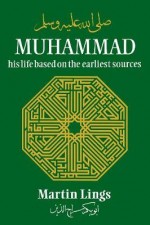
Muhammad his life based on the earliest source
08 March 2019 -
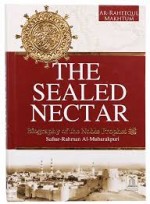
The Sealed Nectar
08 March 2019 -
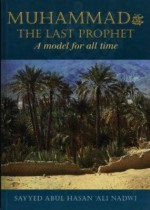
Muhammad The Last Prophet a model for all time
08 March 2019 -
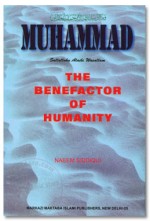
Muhammad (pbuh): The Benefactor of Humanity
08 March 2019
